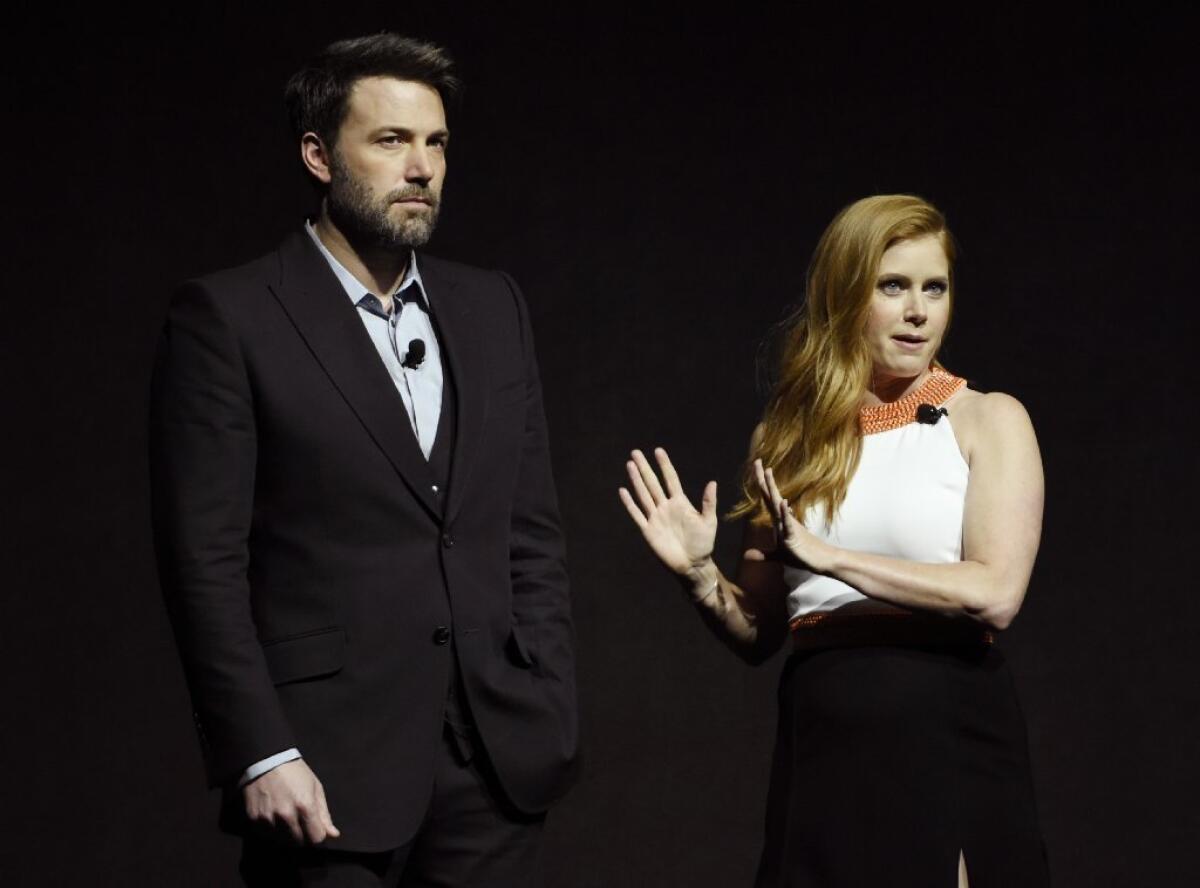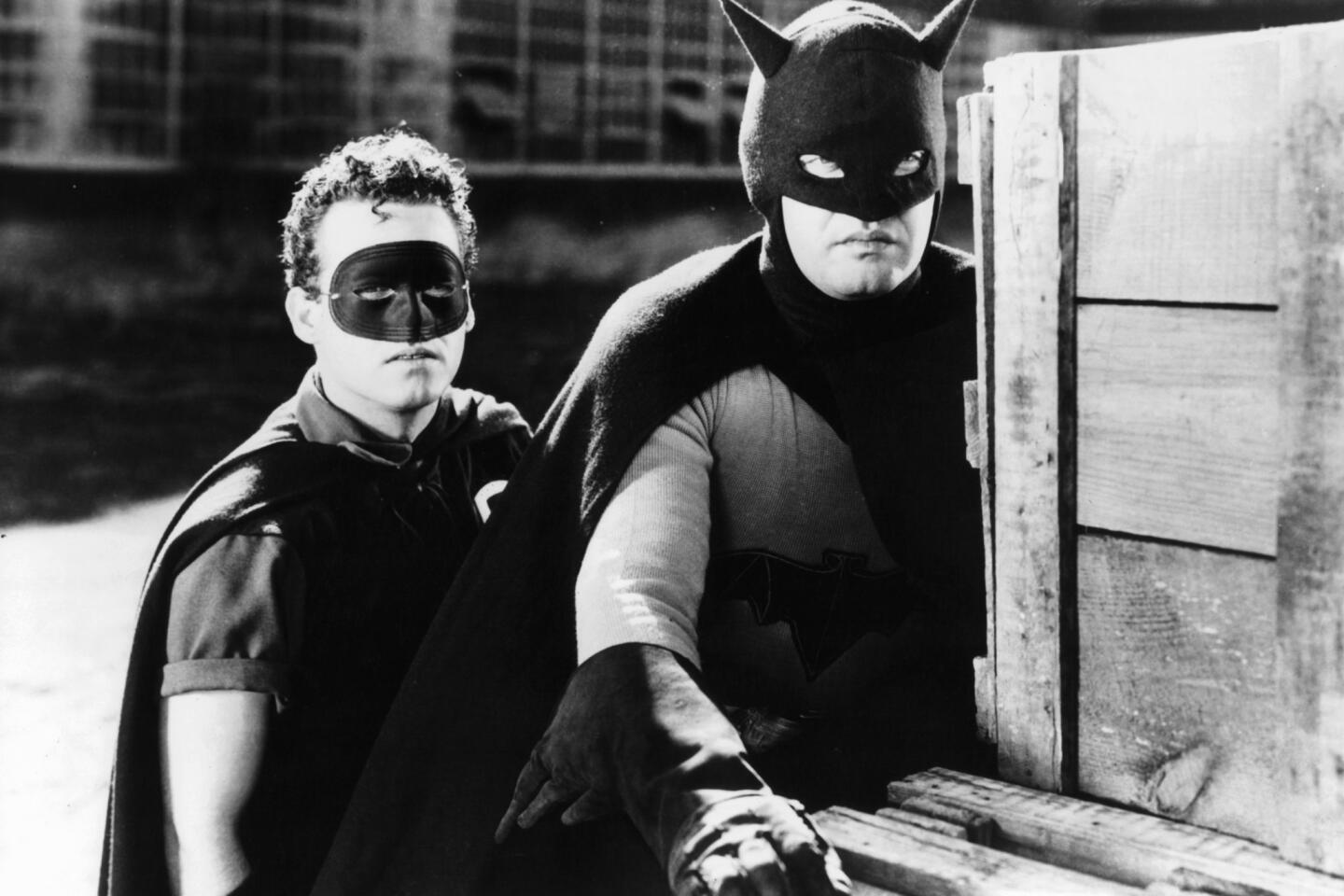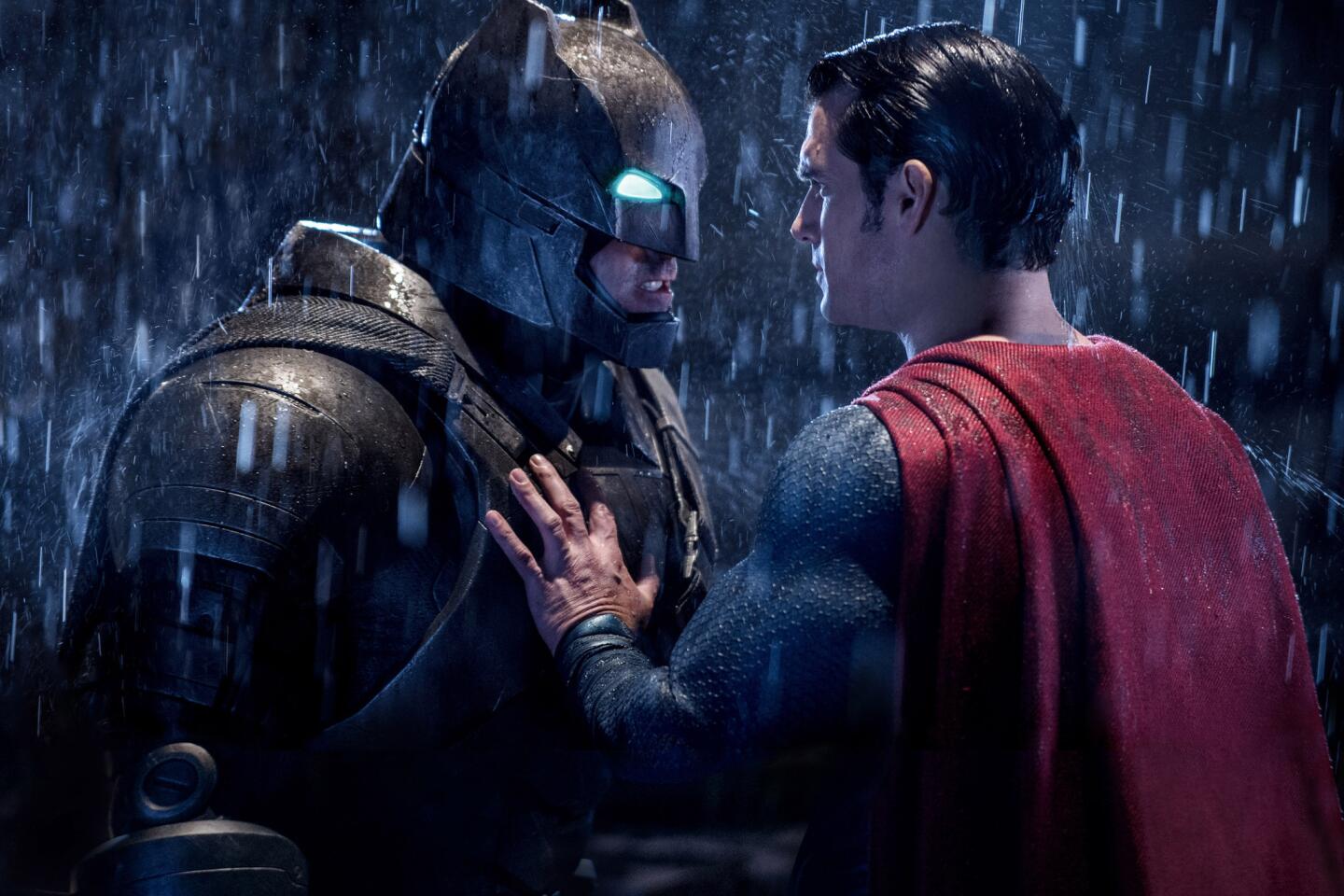As Marvel continues to steamroll, what’s happening inside Warner Bros.’ DC movie universe
On the surface, “Captain America: Civil War” and “Batman v Superman: Dawn of Justice” look like a pair of peas in a spandex pod: two big-budget, big-everything superhero spectacles, each centered on an epic clash between sternly determined do-gooders.
But there the similarity ends.
Kicking off Hollywood’s all-important summer season with a bang, “Civil War” opened this weekend to $181.8 million and nearly unanimous raves — the latest in a nearly unbroken string of successes for Marvel Studios since 2008’s “Iron Man.” By contrast, director Zack Snyder’s “Batman v Superman” has been bogged down by kryptonite-like bad buzz since its opening in March, raising uncomfortable questions about Warner Bros.’ stewardship of its critically important DC Comics slate.
In a film industry in which there are ever-fewer guaranteed hits, “Batman v Superman” was supposed to be the closest thing to one a studio executive could hope for, combining three of the most iconic and beloved characters in pop culture: the Dark Knight, the Man of Steel and Wonder Woman. But from the moment it hit theaters, excitement quickly gave way to disappointment as critics and fans alike blasted the film as narratively muddled and excessively grim compared with the generally fun and quippy Marvel films.
After a record-setting opening, “Batman v Superman” quickly lost altitude at the box office and is now expected to top out at around $900 million worldwide — shy of a disaster but well below Marvel’s 2012 “The Avengers,” which grossed $1.5 billion, or that film’s sequel, which took in $1.4 billion last year. It’s also trailing Disney’s animated “Zootopia,” which features characters no one had ever heard of and has collected $933.7 million and counting.
“ ‘Batman v Superman’ was decidedly mixed,” said Barton Crockett, a media industry analyst at FBR Capital Markets. “It did well enough at the box office to be declared a financial success, but reputationally, it was kind of a misfire.”
Some industry insiders believe the divergent results between the steady run of hits from Marvel (which is owned by Walt Disney Co.) and Warner Bros.’ bumpier track record with its DC films can be traced to the different ways in which creative decisions are made at the two studios.
Marvel’s movies are all personally overseen from start to finish by Marvel Studios President Kevin Feige, whose career producing comic-book films stretches back to 2000’s “X-Men” and who serves a role almost analogous to a television show-runner.
Warner Bros. has no such single figure creatively overseeing its DC films. Snyder has had a major hand in establishing DC’s integrated cinematic universe. But in charting the course of its DC slate, the studio draws on a loose, unofficial brain trust that includes, among others, Snyder and his producer-wife Deborah, Warner Bros. Vice President of Development and Production Jon Berg, DC Comics Chief Creative Officer Geoff Johns and Charles Roven, producer of director Christopher Nolan’s Dark Knight trilogy, “Batman v Superman” and a number of upcoming DC films.
For Warner Bros., the stakes for “Batman v Superman” were far higher than even its hefty $250-million production cost would suggest. The film was designed to set the table for the studio’s ambitious roster of 11 DC superhero films scheduled through 2020, including a two-part “Justice League” movie and stand-alone films featuring characters like Wonder Woman, the Flash and Aquaman.
As the studio grapples with the largely vitriolic reaction to “Batman v Superman,” there have been signs it may be rethinking its approach to that slate.
In late March, the studio’s next comic-book offering, August’s violent supervillain mash-up “Suicide Squad,” underwent reshoots amid reports the studio wanted to inject more humor into the film to distinguish it from the dour “Batman v Superman” and take advantage of the same audience that propelled Fox’s amiably brutal “Deadpool,” which pulled in $761.7 million in February. The film’s director, David Ayer, took to Twitter to call those reports “silly.”
Last week, screenwriter Seth Grahame-Smith, who was set to make his directorial debut with “The Flash,” slated for 2018, left the film over creative differences with the studio. Rumors then flared online that James Wan was feeling apprehension about directing “Aquaman,” also due in 2018, prompting Wan to post a photo on social media of himself standing in front of a large mural of the sea-dwelling superhero to symbolize his commitment to the project.

On Friday, news emerged that Ben Affleck, who played Batman in “Batman v Superman” and is set to reprise the role in future films, will serve as an executive producer on “Justice League.” The elevation of Affleck, who is a respected, Oscar-winning filmmaker in his own right, was presumably intended, at least in part, to reassure fans about the “Avengers”-style team-up film, which is being helmed by Snyder and set for release next year.
Warner Bros. executives declined to comment for this story.
Speaking to The Times recently, Marvel’s Feige said he comes to the comic-book genre as a fan first and foremost. “I don’t know how other people make superhero movies — I only know how we do it,” he said. “We just keep doing it the way we do it, which is, ‘What would be cool? What would we, as fans, want to go see?’ That is behind almost every decision we make.”
While Marvel’s approach to making movies is widely seen as producer-driven, Warner Bros. Entertainment Chief Executive Kevin Tsujihara — who has long described the DC Comics properties as one of the three pillars of his studio’s film strategy (the others being Lego and Harry Potter) — is said to favor a filmmaker-centric one.
“From Day 1, Warner Bros. has always said to me that they are a filmmaker-driven studio and they want each of the DC characters to have the stamp and the trademark of the filmmakers that they’ve picked to come shepherd it,” Wan told The Times in late March. “You have to come in there and play within their sandbox. But the key is to build your own sandcastle.”
To date, however, that approach has had mixed results, with Nolan’s blockbuster, Oscar-winning Dark Knight trilogy on one end of the spectrum and duds like 2011’s “Green Lantern” on the other. (Warner Bros.’ DC television projects such as CBS’ “Supergirl” and the CW’s “The Flash” and “Arrow” — which are overseen by producer Greg Berlanti – have earned more consistent plaudits.)
“Unfortunately, [Warner Bros.] is going to be compared over and over again to Marvel, and Marvel knows what they’re doing,” said one industry insider who has had dealings with both studios and declined to be named due to the sensitivity of the subject. “It’s not an accident that there hasn’t been a bad Marvel movie yet. They know their brand. They have a process. As the director, you’re part of a team, and that team is basically all the same [on every Marvel film]. Warners has always been like, ‘We’re the filmmaker studio.’ And they can’t figure this out.”
Screenwriter and producer Max Landis (“Chronicle”), a genre specialist who has worked for both Fox and Warner Bros., agreed. “There is no over-arching vision. Maybe that’s because of the filmmaker thing,” he said. “But I honestly think the filmmaker thing is only part of it. The bigger part of it is that it’s reactionary. You see what’s happening with ‘Suicide Squad’: ‘Deadpool’ came out and earned a lot of money and critical acclaim, and suddenly ‘Suicide Squad,’ a film that was finished and in the can, is getting reshot. You don’t have to be an insider to see that DC and Warners are in a reactionary place and they’re playing catch-up.”
Simon Kinberg who, as a writer-producer, plays a key role in helping to steer Fox’s comic-book films including the X-Men series, believes it is helpful to have one person who can wrangle a sprawling superhero universe with a unifying vision.
“It’s a complicated thing to be telling even one story, but to be telling multiple stories that are all part of a single tapestry and to keep that all straight — I think it helps to have a person who is balancing that all in their head and is a storyteller,” Kinberg said. “Kevin [Feige] is a storyteller in my mind, very much so.”
At the same time, though, Kinberg emphasized, “I think it is equally important to trust filmmakers to bring their special sauce.”
Director Bryan Singer has directed four X-Men films for Fox, including the forthcoming “X-Men: Apocalypse” and also helmed 2006’s “Superman Returns” at Warner Bros. He said superhero movies can’t be made simply to fill a corporate mandate but need to be conceived and made with the same seriousness and care as any other type of film.
“You can’t just take a bunch of characters and throw them together and stir them up in a soup and hope that it works,” he told The Times recently. “You’ll make a lot of money perhaps but you won’t necessarily progress the universe or satisfy. You have to take your time with them.”
Wade Holden, a research analyst at SNL Kagan who follows the media industry, says that the largely negative reception to “Batman v Superman” will continue to reverberate for Warner Bros. in the near term.
“This was essentially their ‘Justice League’ coming-out party, and it didn’t put up ‘Avengers’-type numbers,” Holden said. “ ‘Captain America: Civil War’ will probably end up doing much better than ‘Batman v Superman.’ ”
Speaking to The Times in March, Affleck emphasized the importance of looking past any one film’s performance in favor of a longer view, saying the studio will generate tremendous value over time from its “under-exploited” DC properties.
“Will every DC movie be great and be successful? No,” Affleck said. “But if I’m on the board at Warner Bros., do I look at DC as a plus for me? Yes. From a long-term portfolio perspective, they’ve already won.”
Times staff writer Meredith Woerner contributed to this report.
MORE:
How Spider-Man saved ‘Civil War’ from being too predictable
Michael Fassbender picks up ‘Assassin’s Creed’s’ history on the job
Everyone at Cannes had the same question for Woody Allen – but no one asked it
So meta: Watch Patrick Stewart watch James McAvoy as he finally shaves his head for ‘X-Men’
Every single movie coming out this summer
More to Read
Only good movies
Get the Indie Focus newsletter, Mark Olsen's weekly guide to the world of cinema.
You may occasionally receive promotional content from the Los Angeles Times.













